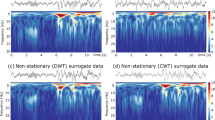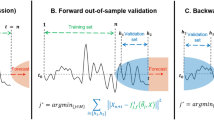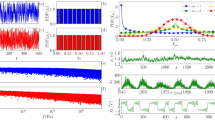Abstract
DETERMINING whether time series of data from dynamical systems exhibit regular, stochastic or chaotic behaviour is a goal in a wide variety of problems. For sparse time series (those containing only of the order of 1,000 data points), the goal may simply be to discover whether the series are chaotic or not. Examples are case rates for infectious diseases1 and proxy palaeoclimatic records from deep-sea cores2. Sugihara and May3 have recently extended previous work4 aimed at distinguishing chaos from noise in sparse time series. Their approach is based on a comparison of future predictions of terms in the time series—derived using a data base of information from another part of the series—with the known terms. Here I present a method for estimating from such forecasting the largest Liapunov exponent of the dynamics, which provides a measure of how chaotic the system is—that is, how rapidly information is lost from the system.
This is a preview of subscription content, access via your institution
Access options
Subscribe to this journal
Receive 51 print issues and online access
$199.00 per year
only $3.90 per issue
Buy this article
- Purchase on Springer Link
- Instant access to full article PDF
Prices may be subject to local taxes which are calculated during checkout
Similar content being viewed by others
References
Olsen, L. F. & Schaffer, W. M. Science 249, 499–504 (1990).
Nicolis, C. & Nicolis, G. Nature 311, 529–532 (1984).
Sugihara, G. & May, M. Nature 344, 734–741 (1990).
Farmer, J. D. & Sidorowich, J. J. Phys. Rev. Lett. 59, 845–848 (1987).
Kolmogorov, A. N. Dokl. Acad. SSSR 124, 754 (1959).
Mandelbrot, B. B. The Fractal Geometry of Nature (Freeman, New York, 1983).
Schuster, H. G. Deterministic Chaos 2nd Ed. (VCH, Weinheim, 1989).
Grassberger, P. & Procaccia, I., Phys. Rev. A28, 2591–2593 (1983).
Grassberger, P. Nature 323, 609–612 (1986).
Vautard, R. & Ghil, M. Physica D35, 395–424 (1989).
Shannon, C. & Weaver, W. The Mathematical Theory of Communication (Illinois University Press, Urbana, 1949).
Schlögl, F. Probability and Heat (Vieweg, Braunschweig, 1989).
Sano, M. & Sawada, Y. Phys. Rev. Lett. 55, 1082–1085 (1985).
Eckmann, J.-P., Kamphorst, S. O., Ruelle, D. & Ciliberto, S. Phys. Rev. A34, 4971–4979 (1986).
Lichtenburg, A. J. & Lieberman, M. A. Regular and Stochastic Motion (Springer, New York, 1983).
Beck, T. L., Leitner, D. M. & Berry, R. S. J. chem. Phys. 89, 1681–1694 (1988).
Casdagli, M. Physica D35, 335–356 (1989).
Author information
Authors and Affiliations
Rights and permissions
About this article
Cite this article
Wales, D. Calculating the rate of loss of information from chaotic time series by forecasting. Nature 350, 485–488 (1991). https://doi.org/10.1038/350485a0
Received:
Accepted:
Issue Date:
DOI: https://doi.org/10.1038/350485a0
This article is cited by
-
Exploring chaotic attractors in nonlinear dynamical system under fractal theory
Multidimensional Systems and Signal Processing (2018)
-
The chaotic dynamics of high-dimensional systems
Nonlinear Dynamics (2017)
-
Geosystemics: A Systemic View of the Earth’s Magnetic Field and the Possibilities for an Imminent Geomagnetic Transition
Pure and Applied Geophysics (2015)
-
Distinguishing Separate Components in High-dimensional Signals by Using the Modified Embedding Method and Forecasting
Annals of Biomedical Engineering (2010)
-
Dynamical changes in the ENSO system in the last 11,000 years
Climate Dynamics (2009)
Comments
By submitting a comment you agree to abide by our Terms and Community Guidelines. If you find something abusive or that does not comply with our terms or guidelines please flag it as inappropriate.



